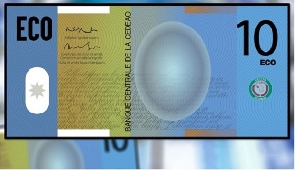Economics Lecturer at the University of Ghana, Dr Adu Owusu Sarkodie, is cautioning the hasty nature with which the ECOWAS bloc is working to implement the Eco.
Countries that meet a set of economic prescriptions necessary for the adoption of the ECOWAS-backed currency can commence the eco usage, he explained.
According to him, there is the need for the region to build strong economic buffers in the form of sustained fiscal discipline to be able to withstand the shocks that the use of a common currency presented.
While some countries on the bloc continue being inconsistent in maintaining fiscal discipline and consequently failing to meet the criteria needed for the adoption of the common currency, the economist believes that all members kick starting the Eco usage in the short-term would spell doom for ECOWAS.
“The ECO as a currency for the ECOWAS region is laudable. However, it must not be rushed by the body to get it being used when the region does not have a common economic fundamentals,” he stated.
2020 Dateline
The ECO is expected to start circulating within ECOWAS countries that have met a criteria in January 2020.
The criteria are fiscal deficit of not more than three per cent of Gross Domestic Product (GDP), average annual inflation of not more than 10 per cent and gross international reserves of not less than three months of import cover which have eluded the 15-member countries since 2000.
Postponements
Conceived in 2000, the ECO was planned to be operational in Anglophone West Africa in 2003 but suffered four postponements in 2005, 2010, 2014 and 2015 due to sustained fiscal slippages in the region and little political commitment to the cause.
At the ECOWAS summit on June 29, last year, the leaders agreed that the earlier plan to adopt the ECO in all member countries in 2020 would remain and that they would further roll out a plan to help members meet the required criteria.
But the new date is also likely to suffer a hitch, according to experts.
In a 2016 report on the ECO, the African Development Bank (AfDB) said it was “likely that the 2020” timeline would also be postponed.
Business News of Monday, 27 January 2020
Source: www.ghanaweb.com

















